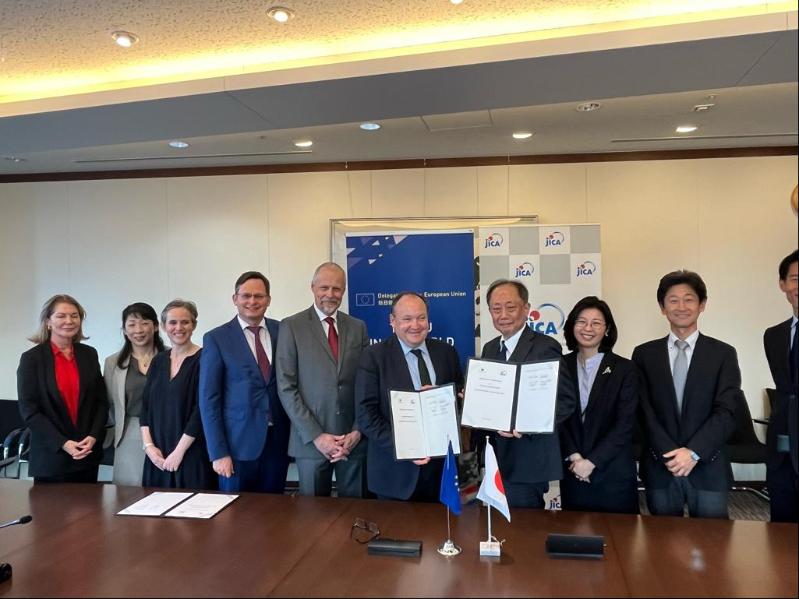
- Today in Tokyo the European Investment Bank (EIB) and the Japan International Cooperation Agency (JICA) signed a memorandum of understanding to foster their cooperation.
- It will promote closer collaboration between the two institutions to support sustainable economic and social development outside the European Union for three years.
- This new memorandum of understanding is a renewal of one signed between the EIB and JICA in 2019.
EIB Vice-President Ambroise Fayolle said: “I very much welcome the continued collaboration between the EIB and JICA that will see them join forces to broaden their cooperation to foster sustainable economic and social development outside the European Union, notably in sustainable infrastructure, the just energy transition and climate action. This will enable both institutions to continue to benefit from their respective extensive and long-standing experience in less developed countries.”
JICA Senior Vice President Hironori Shibata said: “I am honoured to sign the renewed memorandum of understanding with the EIB today. I look forward to further strengthening cooperation with the EIB in order to deal with the current compounding crises and to achieve the Sustainable Development Goals.”
Jean-Eric Paquet, EU Ambassador to Japan, said: “This new memorandum of understanding will be instrumental in operationalising the Partnership on Sustainable Connectivity and Quality Infrastructure between the European Union and Japan, and will further strengthen cooperation in view of the EU Global Gateway strategy to address today’s global challenges.”
The EIB and JICA cooperation will focus on identifying co-financing and co-investment opportunities in projects in various developing countries that match the objectives of the two institutions. They will cooperate on climate action, including support for the energy transition and high-quality infrastructure investment in line with the G20 Principles for Quality Infrastructure Investment endorsed at the G20 Osaka Summit in June 2019. Other areas of support will include strengthening resilience, microfinance and any other areas that are mutually decided to be of common interest in various developing countries.
As part of the previous memorandum of understanding between the EIB and JICA signed in 2019, both institutions are evaluating various projects of common interest, for example in the green energy and transport sector in Southeast Asia.
Background information
About the EIB
The EIB brings the experience and expertise of our in-house engineers and economists to help develop and appraise high-quality projects. As an AAA-rated, policy-driven EU financial institution, the EIB offers attractive financial terms — competitive interest rates with loan durations aligned with projects. Through our partnerships with the European Union and other donors, we can provide grants to further improve the development impact of the projects we support.
EIB Global is the EIB Group’s specialised arm dedicated to increasing the impact of international partnerships and development finance. EIB Global is designed to foster strong, focused partnership within Team Europe, alongside fellow development finance institutions, and civil society. EIB Global brings the Group closer to local people, companies and institutions through our offices across the world.
https://www.linkedin.com/company/eib-global/
About the Global Gateway initiative
EIB Global is a key partner in the implementation of the EU Global Gateway initiative, supporting sound projects that improve global and regional connectivity in the digital, climate, transport, health, energy and education sectors. Investing in connectivity is at the very heart of what EIB Global does thanks to the Bank’s long-standing experience of 60 years. Alongside our partners, fellow EU institutions and EU Member States, we aim to support investment of €100 billion — around one-third of the initiative’s overall budget — by the end of 2027.
About JICA
JICA, in charge of administering Japan’s official development assistance, is one of the world’s largest bilateral aid agencies. It supports developing countries in addressing their development challenges through a flexible combination of various cooperation instruments, such as technical cooperation, finance and investment cooperation, and grants. JICA has 96 overseas offices and operates in approximately 150 countries and regions of the world. It also has 15 domestic offices across Japan that serve as a nexus linking developing countries with regions in the country.

©EIB
Download original

©EIB
Download original

©EIB
Download original

©EIB
Download original